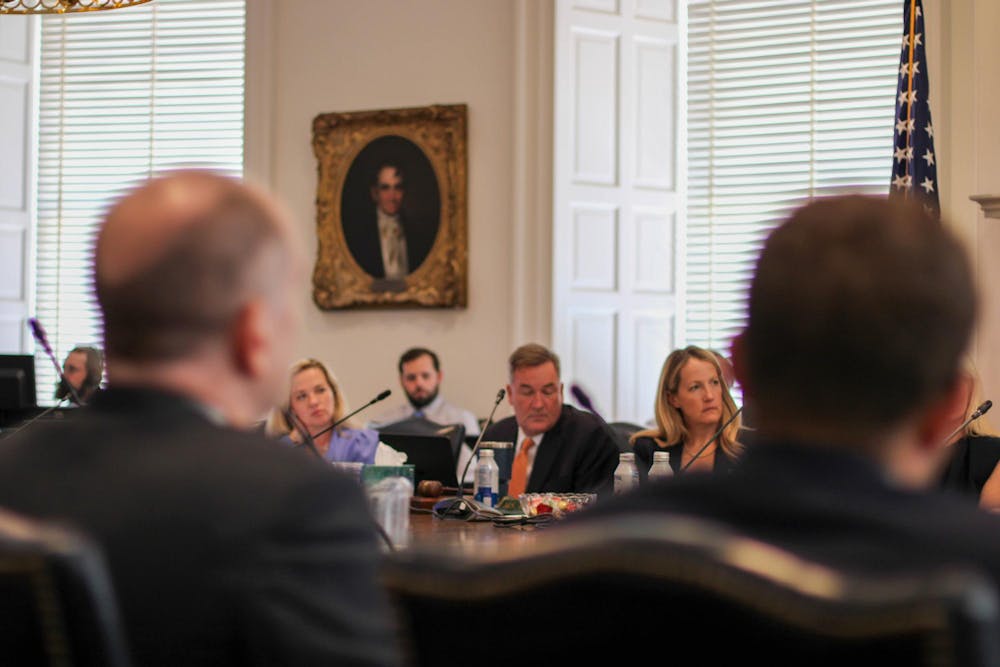In recent weeks, the Virginia Senate’s Privileges and Elections Committee blocked another slate of appointees for Boards of Visitors across our state. The effects of this are dire — the University’s Board is missing five members, and the Board at George Mason University is unable to even make a quorum, effectively shuttering their operations. This present predicament is a reflection of broader systemic issues within the statewide governing board confirmation process, issues that can and must be fixed. In an environment where systemic procedural problems have impaired the stability of our universities, it is clear that changes to the appointment process must be made.
These changes necessitate first reflecting on how the complex political processes brought us to this moment. Currently, a months-long waiting period exists between the appointment of nominees by Gov. Glenn Youngkin and their legally required confirmation by the Committee or legislature. What this means is that nominees frequently serve on their University Board for several months before they are confirmed by the Committee, let alone the Virginia legislature.
For example, in June 2022, Youngkin appointed Bert Ellis and three other nominees to our University’s Board. Only in February of 2023 were they confirmed by the Virginia legislature, an eight-month delay during which these nominees participated in emergency sessions relating to the November shooting. In the midst of crises, our University’s Board contained members who had not been subject to the process of legislative confirmation that provides our Board with legitimacy and voters with a voice in our University leadership.
This summer, it became clear how destabilizing this norm of waiting for formal confirmation could be. In the last several months, Democrats have argued that recent Youngkin nominees involved in University operations have not been adequately protecting their universities in the face of attacks by the Trump administration. Because of this, they voted to reject these nominees at the committee level, first in June and then again last week.
Republicans, led by Virginia’s Attorney General Jason Miyares, subsequently instructed these appointees to remain active on their Boards, arguing that the Democrat-led action was illegal. Democrats then challenged this in court which led to an injunction by Fairfax Circuit Court Judge Jonathan D. Frieden, effectively saying that the Democrat-led rejection was a legal
Though legally legitimate, the actions taken by the Committee have created a great deal of uncertainty in higher education. At our University, the number of rejected nominees creates the risk that our Board may not have enough University alumni or Virginia residents to function. Additionally, two of the Board nominees rejected last week had been named to the presidential selection committee. With Miyares appealing Frieden’s court order to the Supreme Court of Virginia and arguing for appointees to retain their positions, this political imbroglio only brings further confusion to our selection process — will these nominees serve on the committee until a judge rules otherwise, or will they respect the rejection by the legislative committee? These questions which loom over our University and its processes clarify that the norms for Board appointment further politicize the process and engender instability within our selection committee.
The political standoff surrounding appointments has had an even harsher effect at GMU. With 10 nominees rejected, GMU’s Board is unable to make a quorum, essentially preventing it from doing anything. Meanwhile, while GMU’s Board is rendered null, the Department of Justice has initiated multiple probes into diversity, equity and inclusion practices, among other matters. In a time where federal attacks necessitate institutional support, GMU’s Board cannot meet to further defend its president through measures like extending his contract, nor can they chart a strategy against this gross intrusion on university autonomy.
The destabilizing consequences of the present appointment process have revealed critical and unsustainable fault lines that rest within our political system. Under the stress-test of an invasive federal government, a sycophantic Virginia governor and a strong-minded Virginia legislature, our system of appointments has buckled in a way that grinds the structures of our universities to a halt. Faced with this far-reaching failure, procedural changes must be made to our political system — changes which both limit further politicization of the appointment process and ensure that universities are able to continue operations.
One possible avenue for fixing the clear holes in the appointment system would be to institute holdover rules, as used in Hawai’i and Wisconsin, where board members stay in place until a successor is confirmed. This would intuitively align with already announced desires by Senate Democrats to disallow Board members from sitting on their Boards until confirmed by the Committee. Another potential fix would be to shorten the length of time between Committee votes and full confirmation by the legislature. Admittedly, there is no set answer for what solution should be put in place — the only failure would be to ignore the need for a solution altogether.
The fact that the stability of our University and GMU has been so weakened by the fragility of our appointment process is a plague on both our political parties. Without a secure political process for appointments, our universities have been left with administrative realities that are at best delegitimized and at worst nonfunctional. Whether such actions by either party have been warranted or not, both parties must grapple with the institutional consequences of their actions. We often hear that the political system is broken — now, for the sake of Virginia's students, Virginia’s leaders must find a solution.
The Cavalier Daily Editorial Board is composed of the Executive Editor, the Editor-in-Chief, the two Opinion Editors, two Senior Associates and an Opinion Columnist. The board can be reached at eb@cavalierdaily.com.







